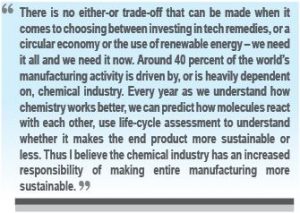Sustainability has become a powerful worldwide movement with government, industry and civil society realising that there is no other way, other than putting sustainability principles to work and into action to ensure that future generations are left with enough resources for their comfortable living on earth, that the ill effects of climate change are reversed before it reaches a point of no return and our entire living shifts to using materials that are totally benign to the environment, recyclable with no waste.
Sustainability is moving into wider and wider deployment in industry. What is the plan of action for its effective implementation and how can the results from transition to sustainable operations from each industry and every company be measured.
Chemical Industry Digest in this special focus on sustainability in the chemical industry, discusses, debates and articulates the views of CEOs of global MNCs and major chemical companies, premier research organisation and global renewable carbon research and consultancy organisation.
Chemical Industry Digest is privileged to obtain the views of Chandrakant Nayak, CEO & Country President of Dow India. His views are presented here.
 Chandrakant Nayak is CEO and Country President of Dow India (including Sub-Continent) and has a dual responsibility as Senior Sales Director for Dow Polyurethanes business. He joined Dow India in 1995 as Account Manager for Polyethylene business in Mumbai. More than 25 years, he has been in various roles across sales, marketing, business development and business and asset management across several businesses of the company. He has been closely associated with development of company’s marquee CSR Program – The Polyurethanes (PU) Jaipur Foot since 2006. A people’s leader, fondly called Chandra by colleagues, he is passionate about inclusion in workforce.
Chandrakant Nayak is CEO and Country President of Dow India (including Sub-Continent) and has a dual responsibility as Senior Sales Director for Dow Polyurethanes business. He joined Dow India in 1995 as Account Manager for Polyethylene business in Mumbai. More than 25 years, he has been in various roles across sales, marketing, business development and business and asset management across several businesses of the company. He has been closely associated with development of company’s marquee CSR Program – The Polyurethanes (PU) Jaipur Foot since 2006. A people’s leader, fondly called Chandra by colleagues, he is passionate about inclusion in workforce.
Chemical Industry Digest (CID): How can we rid the concept of sustainability an arbitrariness and introduce a practical set of matrices to define it clearly? What are its more important components and characteristics, based on which best in class, measurable
outcomes can be drawn?
Chandrakant Nayak (CN): Having been invested in the concept for several decades and adopting it ahead of industry, we have found the business case for sustainability. For us, sustainability has evolved from a concept to a measurable ambition weaved in our business strategy.
 The journey started for us in 1990, when we first created an advisory council and original goals for 1995-2005. These were centred on improving the footprint of our operations through energy efficiency, emissions, and safety. Our second decade goals were focussed on our handprint. We introduced product stewardship and lifecycle assessments for our solutions while continuing our footprint reduction. Thereafter, for 2015-2025, we developed a blueprint for a sustainable planet and society. As we get closer to reaching our ambitious 2025 sustainability targets, last year we announced multi-decade targets. This put us on a path to achieve carbon neutrality by 2050, eliminate plastic waste in our environment and increase our positive impacts on society, our customers, and our business. All our efforts are centred on three key pivots – protect the climate, close the loop, and stop the waste.
The journey started for us in 1990, when we first created an advisory council and original goals for 1995-2005. These were centred on improving the footprint of our operations through energy efficiency, emissions, and safety. Our second decade goals were focussed on our handprint. We introduced product stewardship and lifecycle assessments for our solutions while continuing our footprint reduction. Thereafter, for 2015-2025, we developed a blueprint for a sustainable planet and society. As we get closer to reaching our ambitious 2025 sustainability targets, last year we announced multi-decade targets. This put us on a path to achieve carbon neutrality by 2050, eliminate plastic waste in our environment and increase our positive impacts on society, our customers, and our business. All our efforts are centred on three key pivots – protect the climate, close the loop, and stop the waste.
That said, every organization is on its own unique journey to success and must set their own impactful yet measurable targets that make business sense. Sustainability is not a trend anymore; it is the need of the hour and the duty of every corporation to its operating environment.
CID: To put sustainability principles into practice, how should an industry/manufacturing unit go about it? What could be a practical roadmap with a plan of action?
CN: This is a very pertinent question, especially for an emerging economy like India that has recently focused on strengthening its manufacturing capabilities. Economic prosperity cannot be achieved at the cost of the environment. Three parameters are very critical to setting-up facilities that make business sense and are sustainable – scale, technology and competitiveness. In today’s era the interoperability of efficient design, processes, and workflows are important for any company to continuously invest and refurbish facilities from environment, health and safety point of view. Enterprises should move to a ‘zero-defect and zero effect’ model, and commit to the production of quality products without significantly impacting the environment that it is operating in.
In my opinion this does require reassessing every step and flow map of your work processes, so that the gaps are identified and integrated to bring out the most effective results. Focus on quality manufacturing with fewer defects and recycling of waste products will not only have minimal impact on the environment, but also improve cost competitiveness and place Indian products at par with global benchmarks, if not exceed them.
CID: Business and industry are until now modelled on profitability outcomes which override other concerns. So how can corporates transit to the platform of sustainability, from the current mindset of take – make – and dispose?
CN: We have a more progressive outlook – organizations that are driven by purpose rather than profits, on creating value over winning market share, are the only ones that are poised to see success in times to come. Not only is it important to ensure a top-down commitment from management, but also crucial to ensure employees are aligned to take initiatives from intent to action.
 By harnessing the power of purpose and integrating it into decision-making, we can create long-term sustainable value – for the business, for end consumers and the communities we operate in. We place heavy emphasis on ‘development’ to improve cost positions and address sustainability issues, thus transitioning our solutions from linear to a circular economy. By being conscious and investing in nature, businesses can save money, reduce risks, and build value for shareholders, stakeholders, and customers. As per our metrices, projects that we are investing in as part of our sustainability efforts will result in business value of USD 1Bn by 2025.
By harnessing the power of purpose and integrating it into decision-making, we can create long-term sustainable value – for the business, for end consumers and the communities we operate in. We place heavy emphasis on ‘development’ to improve cost positions and address sustainability issues, thus transitioning our solutions from linear to a circular economy. By being conscious and investing in nature, businesses can save money, reduce risks, and build value for shareholders, stakeholders, and customers. As per our metrices, projects that we are investing in as part of our sustainability efforts will result in business value of USD 1Bn by 2025.
CID: What factors are driving the adoption of sustainability by companies? What enabling factors can drive sustainability at an accelerated pace?
CN: Compliance is the bare minimum that any organization must adhere to, sustainability goes well beyond. Organizations must ponder and determine their business processes and practices from an environment, societal and governance standpoint.
We aim to deliver a sustainable future for the world through our expertise in materials science and in collaboration with our partners, thus going beyond our own action and embedding it into our ecosystem. Our approach to Sustainability has always been proactive, and far ahead of the compliance requirements or any kind of regulatory pressures. Infact we have always been at the forefront of collaborating with the industry to create best-in-class processes like Responsible Care®, Nicer Globe®; we have divested from value chains like Chlorine value chain strategically.
Technological innovations and interventions can accelerate the adoption. Investing in people and resources is crucial because solutions we need potentially do not exist or are in its infancy. We need to shift to power that is renewable as well as optimize the use of feedstock. All of this will incrementally add to the benefits that businesses will see in the long-term.
CID: Climate change and consequent global warming and its disastrous impact on the world are real and even frightening. What technological remedies are feasible in the short term & in the longer-term to address this? Can green chemistry help in moving towards zero hazardous chemicals and chemicals with least environmental load?
CN: Climate change has increased the frequency of severe weather conditions across the world. Our communities and businesses face threats to infrastructure, ecosystems, health, and the economy, if global warming continues. There is a real and calculable cost to inaction, a cost that only worsens with time. No country, community or company is insulated from this global challenge.
Thus, partnering with allies – across business, government, and society – to level the global playing field and ensure alignment on credible, effective, and long-lasting solutions will be critical. There is no either-or trade-off that can be made when it comes to choosing between investing in tech remedies, or a circular economy or the use of renewable energy – we need it all and we need it now. Around 40 percent of the world’s manufacturing activity is driven by, or is heavily dependent on, chemical industry. It is one of the most pervasive branches of science. Every year as we understand how chemistry works better, we can predict how molecules react with each other, use life-cycle assessment to understand whether it makes the end product more sustainable or less. Thus I believe the chemical industry has an increased responsibility of making entire manufacturing more sustainable.
CID: To what extent can the adoption of Industry 4.0 digital technologies enable sustainability?
CN: Investment in, and the adoption of Industry 4.0 digital technologies can enhance an organization’s sustainability efforts. Industry 4.0 can point to specific gaps right from sourcing to delivery in an enterprise, thus aiding faster design, novel projects, reduced risks, elimination of waste, etc. By leveraging technology throughout the enterprise, and across every business, enterprises can build a holistic business model that is agile enough to respond to constantly evolving consumer needs.
From the perspective of the government, Industry 4.0 will set new benchmarks in measuring compliance real-time, and suggesting corrective action on behalf of regulatory authorities. We have to acknowledge Industry 4.0 itself is in a nascent stage – it holds so much potential. While we are far ahead of the curve, leveraging connected facilities, predictive maintenance using AI, Big Data in throughput engineering, developing platforms on mobility we too are still scratching the surface of what Industry 4.0 can do for us.
CID: Dow India is really big on impact projects. Could you tell us about some of your key projects and why the company finds value in commissioning them?
CN: Impact projects continue to be an integral part of our sustainability commitments. We encourage our businesses to support social impact projects that spotlight business solutions, in partnership with non-profit or non-governmental organizations. We facilitate this through our various business and geography resources.
In India, Dow Packaging & Specialty Plastics has undertaken several such projects. In 2018, they worked in the cities of Bangalore and Pune to collect plastic waste from household and communities and constructed 50 kilometre of roads – using 100 metric tons of plastic waste (equivalent to 25 million flexible pouches). Plastic waste was shredded into small pieces post cleaning and then blended in asphalt. The resultant roads would last longer than traditional roads and reduce estimated greenhouse gas emissions by 30 tons.
Our second impact project is India’s first digital waste management platform, Rethink+. This is a unique take-back program that aims to prevent post-consumer plastic waste from going to landfills, by digitally connecting waste generators, waste aggregators, waste processors and recyclers. This initiative is in collaboration with Recykal, a technology company providing cloud-based solutions for the waste management and recycling industry, and a waste management non-governmental organization (NGO) partner Keshav Sita Memorial Foundation Trust.
We have been closely working with Adv. Afroz Shah’s Date with Ocean Foundation. An army of volunteers dedicated their time to build awareness in local communities to collect plastic waste. Our passionate team has been participating in various beach clean-up initiatives too.
We recently launched My Sustainability Corner, a plastic waste segregation program for school students in communities of Lote, Chiplun. Our NGO partner, Sahyadri Nisarga Mitra (SNM) is fuelled to catch them young, and watch them grow, targeting over 4000+ students inculcating plastic positive behaviour. With an aim to make it a pan India initiative the next phase, the model will be replicated in Chennai, Tamil Nadu and Taloja, Maharashtra.
































